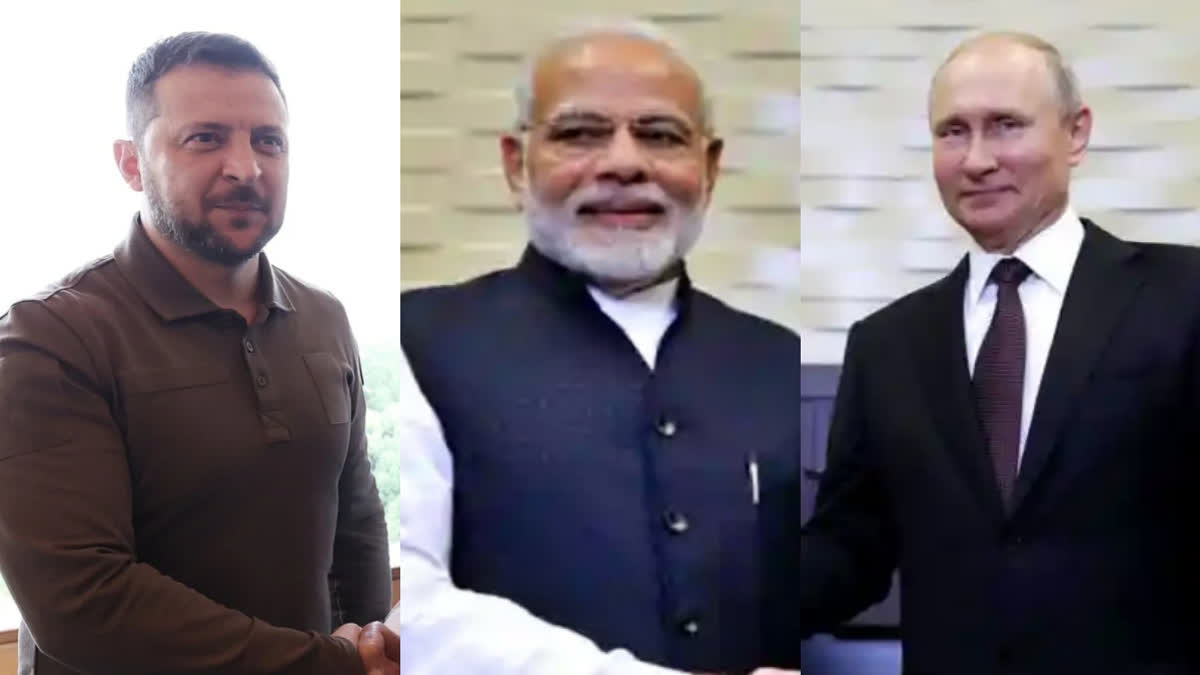New Delhi: Shortly after speaking to Russian President Vladimir Putin, Prime Minister Narendra Modi on Wednesday had a telephonic conversation with Ukrainian President Volodymyr Zelenskyy as well, during which he reiterated that dialogue, diplomacy are the way forward in Russia-Ukraine conflict.
Earlier in the day, Modi had spoken to Putin and congratulated him for winning a fifth term in office in the recent elections, and followed it up with a phone call to Zelenskyy to convey India's "consistent support" for all efforts for peace and bringing an early end to the ongoing conflict.
Both Putin and Zelenskyy have invited the prime minister to visit Russia and Ukraine respectively after the Lok Sabha elections, sources said, adding they see Modi as a "peacemaker". "Spoke with President Putin and congratulated him on his re-election as the President of the Russian Federation," Modi said in a post on X.
Modi said he and Putin agreed to work together to further deepen and expand the India-Russia Special and Privileged Strategic Partnership in the years ahead. A statement by the External Affairs Ministry said while discussing the Russia-Ukraine conflict, Modi reiterated India's consistent position in favour of dialogue and diplomacy as the way forward.
"They also reviewed progress in various issues of bilateral cooperation, and exchanged views on regional and global issues of mutual interest," it said. In his phone call to Zelenskyy, Modi asserted that India supported all efforts for an early and peaceful resolution to the Russia-Ukraine conflict.
"Had a good conversation with President @ZelenskyyUa on strengthening the India-Ukraine partnership. Conveyed India's consistent support for all efforts for peace and bringing an early end to the ongoing conflict. "India will continue to provide humanitarian assistance guided by our people-centric approach," Modi said on X.
Zelenskyy appreciated India's continued humanitarian assistance for the people of Ukraine, a statement said. In a post on X, the Ukrainian leader later said that "it will be important for us to see India attend the inaugural Peace Summit" in Switzerland. Ukraine also wishes to welcome Indian students back to Ukrainian educational institutions, he said.
"I spoke with Prime Minister Narendra Modi to express gratitude for India's support for Ukraine's sovereignty and territorial integrity, humanitarian aid, and active participation in Peace Formula meetings," he said. "We discussed the development of our bilateral relations, which should include a meeting of our teams and a session of the intergovernmental commission on cooperation in New Delhi in the nearest future," he said.
Zelenskyy said Ukraine is interested in strengthening trade and economic ties with India, particularly in agricultural exports, aviation cooperation, and pharmaceutical and industrial product trade. According to a Kremlin readout, Putin wished Modi "for the successful conduct of the upcoming parliamentary elections in India".
Modi is among the few international leaders who have greeted Putin on his re-election. According to the Kremlin statement, both sides noted with satisfaction that mutually beneficial ties in trade, economic and investment fields and in the areas of energy and transport are progressively and dynamically developing in line with a particularly privileged strategic partnership.
"An exchange of views was also held on a number of issues on the international agenda, in particular in the context of the situation around Ukraine," the Kremlin statement said. "The mood for further coordination between Russia and India in multilateral formats, including the Shanghai Cooperation Organization and BRICS, was confirmed," it added.
"The conversation took place in a warm and friendly manner. Vladimir Putin, in turn, wished Narendra Modi successful conduct of the upcoming parliamentary elections in India," the Kremlin statement said. Putin recorded a landslide victory in Russia's election, cementing his already tight grip on power. The result on Monday showed that the three other candidates who ran -- but had not openly challenged Putin -- won 4.31, 3.85 and 3.20 per cent of the vote.
Last month, External Affairs Minister S Jaishankar had indicated that India was open to considering playing the role of a mediator to end the Russia-Ukraine conflict if approached but noted that New Delhi does not believe it should initiate anything on its own.
In an interview with German economic daily Handelsblatt, he also said that following the Ukraine conflict, India's energy suppliers in the Middle East gave priority to supplying petroleum products to Europe that paid higher prices and New Delhi did not have any option but to procure Russian crude oil.
Jaishankar asserted that just as India does not expect Europe to have a view of China that is identical to New Delhi's, Europe should understand that India cannot have a view of Russia that is identical to the European one.
Read More
India Has World's Third Largest Startup Ecosystem; Right Decisions Were Taken at Right Time: PM Modi
Explained: Why Modi’s Upcoming Visit to Bhutan Ahead of LS Polls Assumes Significance



